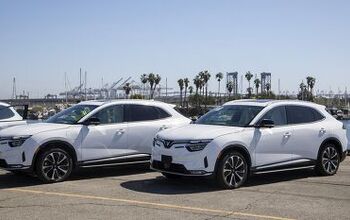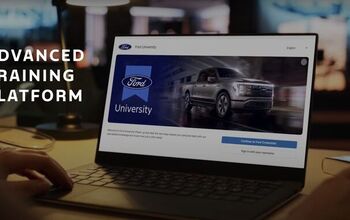Automakers Trying to Stop GOP From Killing EV Tax Credit

As reported last week, House and Senate Republicans have proposed sweeping tax reforms that would, by extension, kill the EV tax credit if the bill passes into law. Automakers have already expressed their distaste on the matter, and now they’re beginning to mobilize to keep it from becoming a reality. With electric vehicles just beginning to gain traction, and numerous manufacturers banking on the platform in the years to come, losing the credit would undoubtedly harm sales.
The Electric Drive Transportation Association, a group representing automakers, suppliers, technology firms, and energy concerns, says it will collaborate with its members and their shareholders to ensure the credit persists under the proposed GOP reform. Genevieve Cullen, the association’s president, claims the group will pull out all the stops to ensure the Senate sees things their way.
“If the whole underpinning of tax reform is to promote jobs, investment and innovation, the credit is doing exactly that,” she said in an interview with Automotive News, highlighting that more than 215,000 people are employed in EV development.
Her fear, and the concerns surrounding those she represents, are that the United States would lose its innovative might to China and Europe — both of which are progressing into electrification at a more accelerated rate. By abolishing the tax credit in the U.S. she believes consumers will have less reason to purchase EVs, crippling a burgeoning segment within the industry that’s been hoisted up by Wall Street.
In October, General Motors announced plans to launch over 20 new all-electric and hydrogen fuel cell units by 2023, including two in the next 18 months, as part of its global push in the zero-emission field. Volkswagen Group plans to introduce 30 new EVs, split between VW and Audi, by 2025 — accounting for nearly a quarter of its fleet. Ford wants to put 13 electrified vehicles on the market within the next five years. Obviously, those companies don’t mind having a leg up, and having the government incentivize those vehicles is a big help.
“Nissan has made significant investments in the development of market-leading electric vehicles and public charging infrastructure to support EV drivers,” Nissan spokesman Brian Brockman said in a statement. “We support continuing measures that help encourage greater adoption of EVs given the benefits they can provide such as lowering vehicle emissions and reducing America’s dependency on foreign energy sources.”
“Tax credits are an important customer benefit that can help accelerate the acceptance of electric vehicles. Because General Motors believes in an all-electric future, we will work with Congress to explore ways to maintain this incentive,” GM said in a release.
Still, automakers don’t really have to explore the best way to save the tax credit. Those companies already know lobbyists will be key in breaking into the cold and fickle hearts of lawmakers. Industry representatives are expected to swarm on congress all week, hoping to protect their respective interests and curry congressional favor.
[Image: Volkswagen Group]

A staunch consumer advocate tracking industry trends and regulation. Before joining TTAC, Matt spent a decade working for marketing and research firms based in NYC. Clients included several of the world’s largest automakers, global tire brands, and aftermarket part suppliers. Dissatisfied with the corporate world and resentful of having to wear suits everyday, he pivoted to writing about cars. Since then, that man has become an ardent supporter of the right-to-repair movement, been interviewed on the auto industry by national radio broadcasts, driven more rental cars than anyone ever should, participated in amateur rallying events, and received the requisite minimum training as sanctioned by the SCCA. Handy with a wrench, Matt grew up surrounded by Detroit auto workers and managed to get a pizza delivery job before he was legally eligible. He later found himself driving box trucks through Manhattan, guaranteeing future sympathy for actual truckers. He continues to conduct research pertaining to the automotive sector as an independent contractor and has since moved back to his native Michigan, closer to where the cars are born. A contrarian, Matt claims to prefer understeer — stating that front and all-wheel drive vehicles cater best to his driving style.
More by Matt Posky
Latest Car Reviews
Read moreLatest Product Reviews
Read moreRecent Comments
- Probert They already have hybrids, but these won't ever be them as they are built on the modular E-GMP skateboard.
- Justin You guys still looking for that sportbak? I just saw one on the Facebook marketplace in Arizona
- 28-Cars-Later I cannot remember what happens now, but there are whiteblocks in this period which develop a "tick" like sound which indicates they are toast (maybe head gasket?). Ten or so years ago I looked at an '03 or '04 S60 (I forget why) and I brought my Volvo indy along to tell me if it was worth my time - it ticked and that's when I learned this. This XC90 is probably worth about $300 as it sits, not kidding, and it will cost you conservatively $2500 for an engine swap (all the ones I see on car-part.com have north of 130K miles starting at $1,100 and that's not including freight to a shop, shop labor, other internals to do such as timing belt while engine out etc).
- 28-Cars-Later Ford reported it lost $132,000 for each of its 10,000 electric vehicles sold in the first quarter of 2024, according to CNN. The sales were down 20 percent from the first quarter of 2023 and would “drag down earnings for the company overall.”The losses include “hundreds of millions being spent on research and development of the next generation of EVs for Ford. Those investments are years away from paying off.” [if they ever are recouped] Ford is the only major carmaker breaking out EV numbers by themselves. But other marques likely suffer similar losses. https://www.zerohedge.com/political/fords-120000-loss-vehicle-shows-california-ev-goals-are-impossible Given these facts, how did Tesla ever produce anything in volume let alone profit?
- AZFelix Let's forego all of this dilly-dallying with autonomous cars and cut right to the chase and the only real solution.


































Comments
Join the conversation
Wait until the Saudis and the Iranians start blowing the living crap out of each other's oil terminals. No subsidies needed at that point.
Isn't the downside of being the capitalist in a capitalist system that you undertake the risk? Isn't one of the problems with government subsidies (of anything) that it socializes the risk while privatizing the rewards? I don't dispute the claim that early government investment - particularly from the military - lead to a lot of advances in tech (communications, PCs, robotics, GPS, the Internet). But my understanding is that, once those first big leaps were made, the military investment dried up and the government's role was recast as that of a buyer taking bids. In other words, they moved to being a large customer playing in a competitive market. But with EVs, the big first steps have already been made. So maybe it's time the government's role shifted to that of buyer. There is talk of "leadership". Okay, what if we ended the subsidies but the federal government committed to buying as many EVs as practical and incentivizing States to do likewise. For example, it would cost the Feds $0 to declare to the States, "Y'all need to have your State fleets be, I dunno, 5% EVs by 2023 if you want to keep your highway funds". The feds do that stuff all the time. Taxpayer money would be saved, Big customers with consistent needs over time would be created, and they would buy into a competitive market. My point is that there are ways of accomplishing the social engineering some favor without raking the taxpayers over the coals.